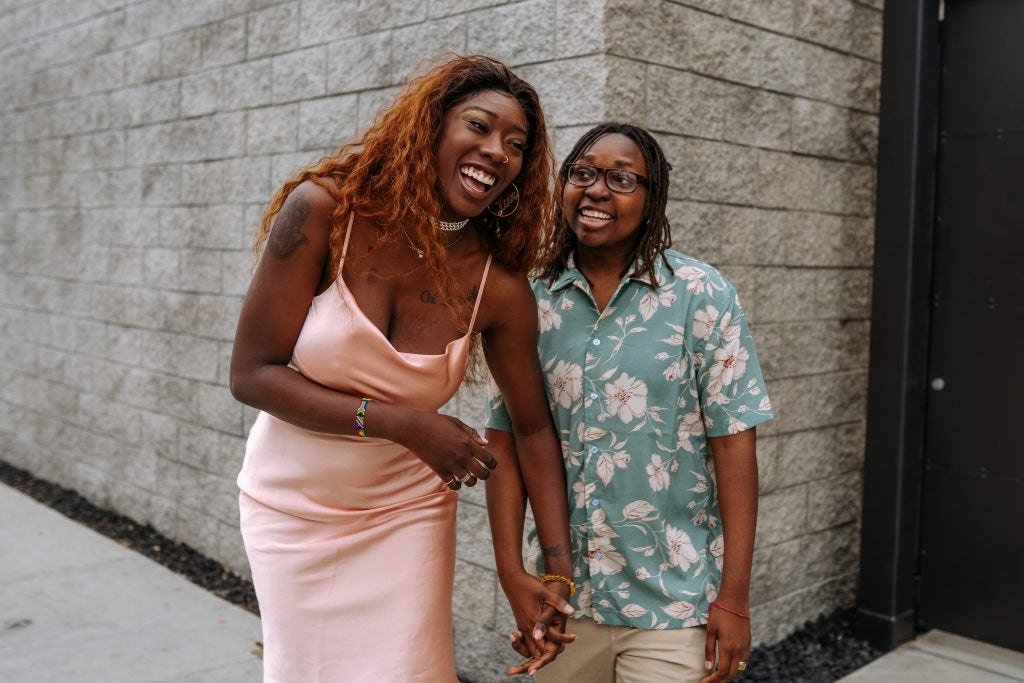
Falling in love is a natural human phenomenon. People do not typically have to actively exert conscious effort to become attracted to someone and fall in love with them. Thanks to our biology, we are pre-programmed to desire close-knit relationships. For most people, this desire is fulfilled by forming intimate relationships with other human beings.
Falling in love is not the problem. Staying in love, however, can become a problem. The American Psychological Association reports that 40-50% of marriages end in divorce.1 Nearly half of all married, and once-in-love, couples fall so far out of love that they call an end to their partnership. Based on these statistics, it is understandable that many question the institution of marriage along with whether it is even possible to stay in love. Fortunately, research suggests that it is.
Research on Staying in Love
Romance in Relationships

Social neuroscientist and relationship expert Bianca Acevedo says that it is possible to stay in love even after decades of marriage. Using fMRI machines, Acevedo and her team scanned the brains of ten women and seven men who were married for an average of 21.4 years. While mapping and watching their brains through the fMRI scanner, the researchers showed the subjects images of several different people. Of the several photos shown to each individual, one was a photo of the subject’s long-term significant other. Another photo was of a close, long-term friend. The next photo was an image of an individual with whom the subject was not familiar. The overall findings suggest that individuals who claim to still be in love are telling the truth. The same regions that lit up in the brain for people who were first falling in love were also activated in people who had been with the same partners for almost 50 years.2 Acevedo’s research suggests that there is scientific evidence to prove that staying in love is not impossible.
Her findings also suggest that the brain pattern that represents love is different in couples who have been in a long-term relationship than it is in couples who have just fallen in love. When long-term couples’ brain activity was examined, the images of their partner also activated brain systems associated with attachment and pair-bonding. Short-term couples’ brain activity only activated regions for love and attraction. This difference in brain activity takes place because long-term relationships are far less anxiety-inducing, given the amount of stability and security that many healthy long-term relationships provide. Acevedo’s results also indicate higher rankings for the long-term romantic partners in the categories of friendship, compassion, joy, pride, love, passion, and sex drive across the board.
Kindness is Key
People commonly wonder how older couples are capable of “keeping the love alive,” particularly when they appear to be just as infatuated with their partner as when they first fell in love. Many yearn to learn the secret to a happy and lasting relationship, and fortunately, research in this area continues to accumulate further information on the subject. According to researchers Gable and Reis, the most important aspect of a lasting relationship is how kindly the partners treat each other. Kindness has a large and lasting impact on a relationship, and can be used to measure a couple’s satisfaction with their partnership as well as how long a relationship can last. A quantifiable way of observing the amount of kindness displayed between partners in a relationship is by studying how partners react to their significant other sharing good news. Research has shown that being there for one another when things go right is more impactful on the quality of a relationship than being there when things go wrong. In her research, Gable and her colleagues brought young-adult couples into a lab to discuss their recent positive life events in hopes of discovering how partners would respond to each others’ good news. Ultimately, they found that that “when close relationship partners, specifically romantic partners, regularly respond to positive event disclosures in a supportive manner, disclosers report feeling closer, more intimate, and generally more satisfied with their relationships than those whose partners typically respond in a non-supportive manner.”3
They also discovered that, in general, couples respond to each other’s good news in four different ways, labeled: passive destructive, active destructive, passive constructive, and active constructive. To explain the difference between these four reactions, we will use the example of one partner in a couple excitedly telling their significant other the excellent news that they had just been accepted into the law school they were most hoping to attend.
If their partner responded in a passive destructive manner, they would ignore the event and potentially redirect the conversation onto themselves, such as by responding with, “You wouldn’t believe my luck today, I won a free t-shirt!”

If this partner responded in a passive constructive way, they would acknowledge the good news, but in an understated and half-hearted manner. An example of this type of reply would be the partner unenthusiastically stating, “That’s great, babe” while not looking up from a game on their phone.
If they responded in an active destructive manner, their reply would diminish their significant other’s accomplishments. They might say something like, “Are you sure you can handle law school? It takes a lot of hard work and studying! And it is so expensive!”
Finally, if they responded in an active constructive manner, they would stop what they were doing and engage whole-heartedly in celebrating their significant other’s success. They could say, “That’s amazing! Congratulations! I know how hard you worked for this!”

Each of these reactions can lead to differences in relationship quality, but researchers found that active constructive responses are the most positive and tend to strengthen relationships most. Shelly reasons that this is because active constructive responses “communicate positive information about the event itself through confirmation of the event’s importance and elaboration on potential implications of the event” as well as convey “positive information about the responder’s relationship with the capitalizer [bearer of good news] through displayed knowledge of the personal significance of the event to the capitalizer and a demonstration of the responder’s own feelings toward the capitalizer.”3 Positively responding to a partner’s success is incredibly important, as it shows them that their significant other not only listens to and cares about their hopes and dreams, but is excited to celebrate their hard work and successes. Positive responses are a vital part of staying in love over time and maintaining a healthy relationship.
Practices for Staying in Love
Love is an incredibly meaningful aspect of many people’s lives. Healthy relationships with partners, family, friends, and other loved ones can be a great source of support, comfort and love. Nevertheless, healthy relationships do not necessarily happen by themselves.4 Staying in love requires effort and understanding, as well as learning about certain practices that can enhance relationships.
Acevedo
Bianca Acevedo and her research partner, Arthur Aron, studied long-term relationships and attempted to discover if romance can remain strong over many years. Through their research, they were able to determine that romance does not have to fizzle out over time. Instead, they found that romantic love can last a lifetime and can lead to more satisfying and successful relationships.5
In their research, Acevedo and Aron reviewed and analyzed 25 studies with over 6,000 individuals in short- and long-term relationships in order to determine whether romantic love was associated with more satisfaction, in comparison to passionate love (similar to romantic love but with added obsessions) as well as friend-like, or companionate, love. Acevedo distinguished between romantic and passionate love by explaining that “romantic love has the intensity, engagement and sexual chemistry that passionate love has, minus the obsessive component. Passionate or obsessive love includes feelings of uncertainty and anxiety. This kind of love helps drive the shorter relationships but not the longer ones”.5 Acevedo and Aron found that those who reported greater passionate love in their relationship were more satisfied in the short-term compared to the long-term, while companionate love was only moderately associated with satisfaction in both short- and long-term relationships. Their results also suggest that those who reported greater romantic love were more satisfied in both short- and long-term relationships, and couples who reported more relationship satisfaction also reported higher rates of happiness and self-esteem.6
Ultimately, Acevedo and Aron were able to conclude that long-term romantic love, without the obsessive element characteristic of new relationships, is a real phenomenon and is positively associated with satisfaction in relationships, better mental health, and more overall well-being.6 This may come as a surprise to some long-term couples, many of whom may believe that it is only natural for romance to fade with time, usually leading to the creation of companionate love. Companionate love is not a bad goal to have: it can be comfortable and nourishing, and in the past may have been seen as the natural progression of a successful relationship. But Acevedo and Aron now point out that letting go of the romance may be an unnecessary compromise as people age, and they encourage couples to consider making a conscious effort to maintain or bring back the romantic aspects of their relationship, a realistic goal that requires energy and devotion.5
Gottman
So if people can stay in love, how can this be achieved? Relationship expert John Gottman and his wife, Julie Gottman, have conducted research over many years in an attempt to pinpoint why couples fall out of love, and more importantly, how couples can stay in love. Gottman compiled his findings into a list of seven principles that he argues ensure long-lasting relationships.
The Seven Principles for Making Marriage Work
1) Enhance Your Love Map
Gottman notes that it is important to “enhance your love map,” when you are in a relationship with someone. When an individual is in a relationship, they should expand their realm of knowledge to include all relevant information to their partner. One should make an effort to learn about their partner’s likes and dislikes, preferences, life goals, feelings, and experiences. Increasing one’s love map allows individuals in a relationship to show their partners that they are taking an interest in their lives beyond the immediate scope of the relationship.7
2) Nurture Fondness and Admiration

Support, nurture, and admiration are essential to long-lasting and happy relationships. Even when “grappling with each other’s flaws,” it is important to recognize and convey to one’s partner that they are worthy of honor and respect. This outward expression of admiration reassures a partner that they are loved, and it can help keep a relationship from deteriorating.7
3) Turn Toward Each Other (Literally)
Gottman found that many individuals in relationships take their partners for granted. Once a relationship has been established, it is common for people to begin ignoring their partners and rejecting their ideas without giving them a fair chance. This is why Gottman stresses the importance of listening to one’s partner and physically turning toward one other during conversation. When an individual turns to their partner while they are talking, they give their partner the affection, attention, and support that a partner-in-love deserves.7
4) Let Your Partner Influence You
Partners should share control over decisions. Gottman notes that the most satisfied and stable relationships are those that include both partners’ involvement in decision-making. When both people have a role in decision-making processes, they are more likely to feel like equals in the relationship. It is important to leave egos behind in order to achieve this balance.7
5) Solve Your Solvable Problems
Gottman points out that healthy arguments do exist. When a problem arises, he recommends going through a specific process in order to resolve the conflict properly. Start the conversation by refraining from any criticism. Instead, partners should openly discuss their concerns or comments in a way that does not involve attacking the other. In addition, using “I” statements can help prevent arguments from turning into blame games. It is also meaningful to accept one’s partner’s faults (that can reasonably be accepted) and be willing to compromise. These tactics can help couples solve issues that will inevitably arise.7
6) Overcome Gridlock
Gridlock happens when an argument makes one or both individuals in a relationship feel like they are unable to compromise with their partner. When an argument does not reach a resolution, this can be understandably frustrating for the people involved. Gottman notes that the most important thing to ask a partner during gridlock is “what are your dreams?”. Oftentimes, conflicts have an underlying problem or theme, particularly about the future or the couple’s future together. Valuing and sharing each other’s dreams can help overcome gridlock and lead to happier relationships.7
7) Create “Shared Meaning”

According to Gottman, all relationships should have an intentional sense of shared purpose. Creating meaning and a culture full of traditions and customs for yourselves and your family can make conflict less intense and less likely to lead to gridlock. Gottman and his wife have observed and analyzed couples in times of conflict, and they have found that it is the way couples fight – and not necessarily what they fight about – that is most likely to determine the quality of the relationship.
It is possible to fall in love and to stay in love, and following Gottman’s seven principles can help individuals attain long-lasting love. It has been suggested that the largest cause of divorce is individuals being unwilling to actively fix their behavior in their relationships. If one is willing to take a step back and analyze their behavior, they may be able to salvage their relationship even after it hits a gridlock.
Concluding Remarks
Love is a vital aspect of most people’s lives, and it is a natural desire to want to share that powerful feeling with another person. Relationships bloom from initial feelings of love and desire, the development of which are not typically couples’ main issues. Instead, it can be exceedingly difficult to stay in love, which is a conscious effort that requires tremendous work. Staying in love takes time and energy, as well as compassion and understanding. It is a joint effort between partners, and if you are attempting to work on your relationship, your significant other should be putting in an equal amount of time and energy. This article has included some of the research on staying in love as well as information on how exactly to retain romantic aspects of a relationship over time. We hope that after reading this article, you feel more confident in your knowledge of love and long-term relationships, including techniques on how to continually foster love with your partner in the future and maintain a healthy relationship.
References
- “Marriage and Divorce.” American Psychological Association. N.p., n.d. Web. 10 May. 2017.
- “Staying in Love by Staying out of Fantasy.” PsychAlive Psychology for Everyday Life. N.p., n.d. Web. 15 May. 2017.
- Gable, S. L., Gonzaga, G. C., & Strachman, A. (2006). “Will you be there for me when things go right? Supportive responses to positive event disclosures.” Journal of Personality and Social Psychology, 91(5), 904–917.
- The Mayo Clinic, “Healthy Relationships”.
- American Psychological Association. (2009, March 1). “Contrary to widely held beliefs, romance can last in long-term relationships, say researchers”.
- Bianca P. Acevedo, PhD, and Arthur Aron, PhD, Stony Brook University; “Does a Long-Term Relationship Kill Romantic Love?” Review of General Psychology, Vol. 13, No. 1.
- Gottman, John M. The Seven Principles for Making Marriage Work: A Practical Guide from the Country’s Foremost Relationship Expert. 2000.
Last Updated: November 18th, 2021.
